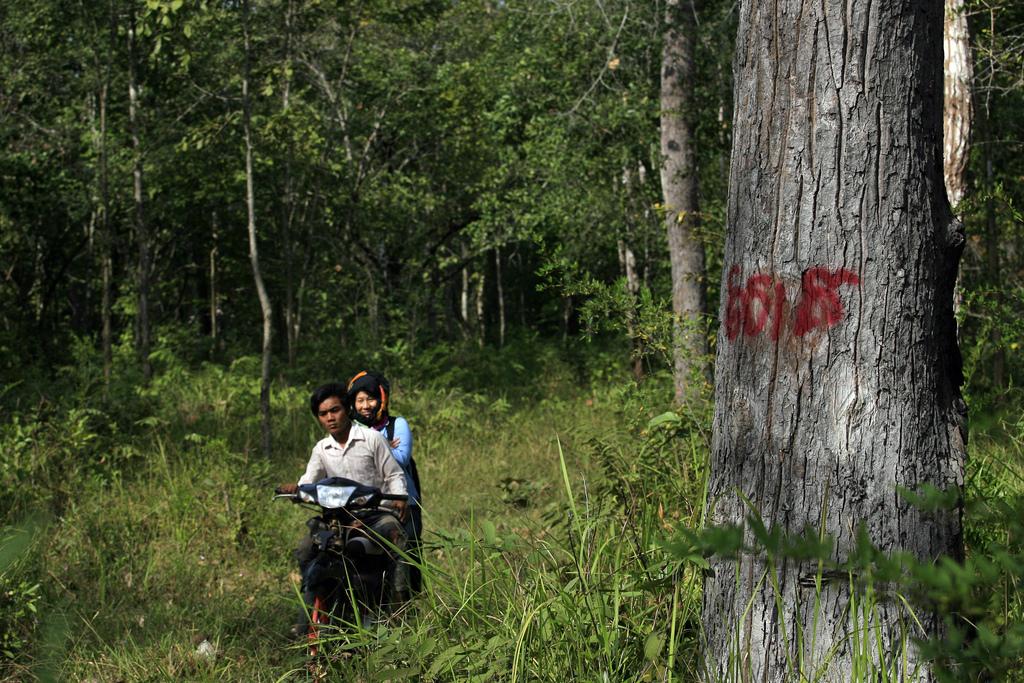
The Indigenous Kuy people of the Prey Lang forest of Cambodia are increasing their efforts in the campaign to promote conservation of their lands and against deforestation by the government and corporations with a new smartphone application to help them better report on what is going on.
The Prey Lang Community Network (PLCN), organized in the early 2000s to protect the forest, first patrolled using the smartphone application in February 2015. With this new technology these roving patrols can move throughout the area and record data, including audio and pictures, remotely.
New reports have disclosed information collected on PLCN patrols from April - July 2015. The patrols, led by volunteer community members, took place in nearly 70 villages across Prey Lang, all of which are facing threats from companies, logging and Economic Land Concessions made by the government. The results documents by the patrollers records the number of illegally felled trees,, depletion of natural resources, and any and all interactions with illegal loggers or transports witnessed by community members.
From the evidence collected, destructive activity in Prey Lang forest is shown to be a constant issue. The PLCN encountered a multitude of illegal loggers, over 40 transports of wood, over 60 tree stumps and confiscated numerous chainsaws. While the PLCN is organized enough to draw up agreements to sign with any loggers they come across to cease and desist their activities, it is certainly not enough to combat the actions of companies and the Cambodian government.
The PLCN has acknowledged that its members do not have enough time to continue these patrols as often is necessary, and have sought contact with a number of government organizations regarding conservation of Prey Lang -- none of which have brought about any real change. The organization itself has faced backlash, such as the murder of activist Chut Wutty in 2012. Wutty was shot while escorting two journalists into an area of illegal logging, supposedly by a man who had also shot a policeman, but this has been much disputed. The courts of Cambodia have decided not to investigate Wutty’s death. Events such as this highlight the dangers land rights defenders face and show the urgent need for support and protection by the Cambodian government, and the implementation of the right to Free, Prior, Informed Consent for Indigenous Peoples regarding development projects on their land, as is established under the UN Declaration on the Rights of Indigenous Peoples.
In September 2015 the PLCN was declared as a winner of the Equator Prize. This prestigious honor is bestowed on 21 Indigenous community-based initiatives battling climate change. Being awarded the prize comes with $10,000 USD and an all expense paid trip to the United Nations Conference on Climate Change that will take place in Paris, France this December. This prize, as well as joining a unique network of nearly 200 past winning initiatives can only mean promising things for the Prey Lang campaign in the future.
“I feel absolutely happy and thankful to our NGO partners that help Prey Lang. We will use this award that is very useful for Prey Lang to take care of natural resources and biodiversity in Prey Lang, to train more people and give them more skills, it is helpful for their livelihood and helpful for Prey Lang,” reacted Mr. Chea Sokhouen, PLCN member from Steung Treng.
Prey Lang forest is an integral part of the culture of the Indigenous Peoples who live within its borders. Within its borders exist more than 20 endangered plant species, 27 endangered animal species, in addition to the near certainty of unknown species yet to be discovered. The Cambodian government must recognize that the forest is vital to the sustainability of Cambodia’s food and water security and that the forest management of these communities is hugely dependent on the continuation of their traditional livelihoods and to the well-being of the forest.
Click here to read the full reports compiled by the Prey Lang Community Network.
